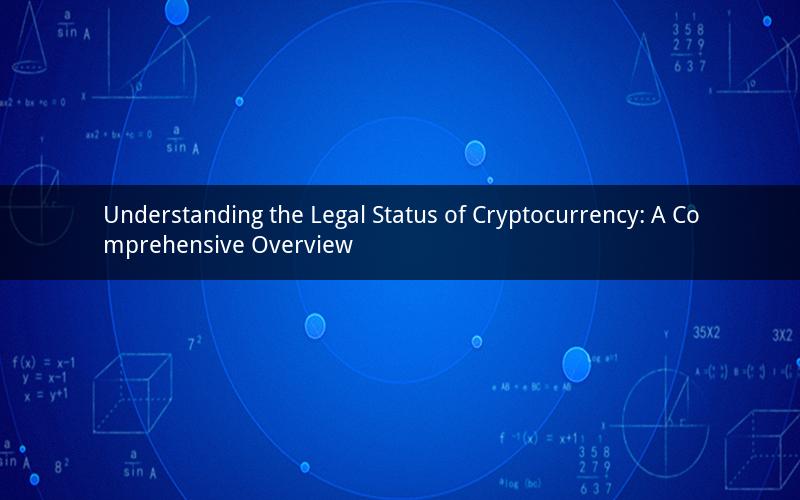
Introduction:
Cryptocurrency has gained immense popularity in recent years, attracting both individuals and businesses worldwide. However, the legal status of cryptocurrency varies from country to country, creating confusion and uncertainty among users. This article aims to provide a comprehensive overview of what cryptocurrency is and its legal status in different jurisdictions.
What is Cryptocurrency?
Cryptocurrency is a digital or virtual currency that uses cryptography for security. It operates independently of a central authority, such as a government or financial institution. Cryptocurrency is typically created through a process called mining, where users solve complex mathematical problems to validate transactions and add new blocks to the blockchain.
The Legal Status of Cryptocurrency:
The legal status of cryptocurrency varies significantly across different countries. Here is an overview of the legal status of cryptocurrency in various regions:
1. United States:
In the United States, cryptocurrency is not classified as a legal tender. However, it is recognized as a digital asset. The Internal Revenue Service (IRS) considers cryptocurrency as property for tax purposes. The U.S. Securities and Exchange Commission (SEC) regulates cryptocurrencies that act as securities, while the Commodity Futures Trading Commission (CFTC) oversees those that are classified as commodities.
2. Europe:
In Europe, the legal status of cryptocurrency varies among member states. The European Union has adopted a regulatory framework known as the Markets in Crypto-Assets (MiCA) Regulation, which aims to provide a harmonized approach to regulating cryptocurrency markets. Individual countries, such as Germany and the United Kingdom, have their own specific regulations regarding cryptocurrency.
3. Asia:
Asia has diverse approaches to the legal status of cryptocurrency. Japan recognizes cryptocurrency as a legal payment method and has implemented regulations to ensure its proper use. South Korea has implemented strict regulations on cryptocurrency trading, while China has banned cryptocurrency transactions and mining activities.
4. Africa:
In Africa, the legal status of cryptocurrency varies from country to country. Some countries, like Nigeria and Kenya, have embraced cryptocurrency and have established regulatory frameworks to regulate its use. Others, like Morocco and Algeria, have banned or restricted cryptocurrency transactions.
5. Latin America:
Latin American countries have different approaches to cryptocurrency. Argentina and Uruguay have recognized cryptocurrency as a legal payment method, while Brazil has implemented regulations to regulate cryptocurrency exchanges. In contrast, countries like Bolivia and Ecuador have banned cryptocurrency.
5 Questions and Answers:
1. Question: Can I use cryptocurrency as a means of payment in my country?
Answer: The legality of using cryptocurrency as a means of payment varies by country. While some countries have recognized it as a legal payment method, others have restrictions or outright bans on its use.
2. Question: Are cryptocurrencies subject to taxation in my country?
Answer: Cryptocurrency taxation varies by country. In some countries, such as the United States, cryptocurrencies are taxed as property. However, in others, they may be taxed as income or capital gains.
3. Question: Can I legally mine cryptocurrency in my country?
Answer: The legality of mining cryptocurrency depends on the country's regulations. Some countries, like China, have banned or restricted mining activities, while others have no specific regulations regarding mining.
4. Question: Are there any regulations on cryptocurrency exchanges in my country?
Answer: The regulations on cryptocurrency exchanges vary by country. Some countries have implemented strict regulations, while others have no specific regulations. It is important to check the legal status of cryptocurrency exchanges in your country.
5. Question: Can I legally trade cryptocurrencies in my country?
Answer: The legality of trading cryptocurrencies depends on the country's regulations. Some countries have recognized cryptocurrency trading platforms and have implemented regulations to ensure their proper operation, while others have banned or restricted cryptocurrency trading.
Conclusion:
The legal status of cryptocurrency varies significantly across different countries, creating challenges and opportunities for users and businesses. Understanding the legal framework in your country is crucial to ensure compliance and avoid legal issues. As the cryptocurrency landscape continues to evolve, it is essential to stay informed about the latest developments and regulations in your jurisdiction.